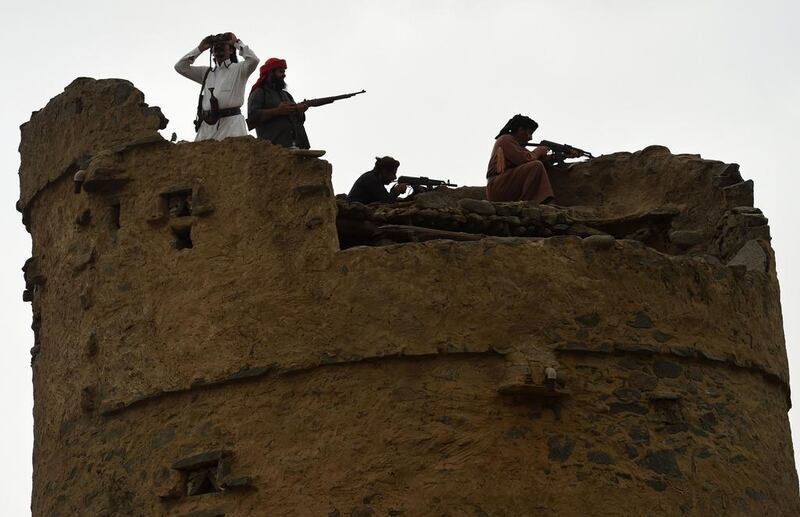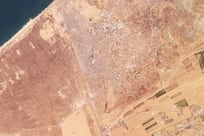SANAA // Saudi Arabia and Egypt are considering whether to hold “large-scale” military exercises in the kingdom, as airstrikes by the Saudi-led coalition targeted Shiite Houthi rebels in neighbouring Yemen on Wednesday.
Warplanes targeted rebel positions in and around the southern city of Aden after overnight attacks by anti-government forces killed seven people, according to military sources and medics.
Residents said the rebels “randomly” shelled residential areas in the city, killing at least three civilians, while four armed supporters of president Abdrabu Mansur Hadi were shot dead.
Airstrikes also targeted rebel positions west of Aden in Ras Imran, where heavy clashes have been raging as the rebels try to advance towards the city’s strategic refinery. Three southern fighters were killed in the fighting, a local hospital medic said.
The rebels appear to be trying to seize petrol reserves stored at the refinery as the country suffers a huge shortage of fuel. Reinforcements, including tanks commanded by rebel troops, arrived in Ras Imran on Wednesday from the province of Lahj.
Meanwhile, in a possible sign that the coalition’s air campaign may expand into a ground operation, Egyptian president Abdel Fattah El Sisi’s office said late on Tuesday that Cairo and Riyadh were considering military drills with other Arabian Gulf countries participating.
“It was decided to form a joint military committee to look into a large-scale strategic manoeuvre on Saudi territory,” said Mr El Sisi’s office after the president met with the Saudi defence minister.
Saudi Arabia and a coalition of Arab countries launched the air strikes on March 26, after the Iran-backed rebels seized the capital Sanaa last year and advanced on the main southern city of Aden, where Mr Hadi had taken refuge.
The Yemeni president fled to Riyadh from Aden, which has since seen heavy fighting between pro and anti-government forces.
Saudi Arabia has accused Iran of arming the rebels, something that Tehran has denied.
Iran’s foreign minister said on Wednesday that his country would use all its influence to broker a peace deal for Yemen in order to end the Saudi-led air strikes.
“We are a major force in the region and we have relations with all groups in various countries, and we are going to use that in order to bring everybody to the negotiating table, to the point that we can,” said Mohammed Javad Zarif.
“We have influence with a lot of groups in Yemen, not just the Houthis and the Shia.”
He added that Iran had already consulted with Turkey and Pakistan, two majority-Sunni allies of Saudi Arabia, and Oman, the Gulf country that maintains the closest ties with Iran. None of the three has joined the Saudi-led air campaign against the Houthis.
World powers united against the rebels on Tuesday, with the UN security council voting to impose an arms embargo on their leaders.
The UN resolution – the first formal action taken by the security council since the start of the Saudi-led raids – demands that the Houthis withdraw from Sanaa and all other areas they have seized.
It also slaps an arms embargo on former president Ali Abdullah Saleh and his eldest son, Ahmed.
The Houthis have allied with troops loyal to Mr Saleh, who was forced from power in 2012 following a year of nationwide protests against his three-decade rule.
Yemeni military sources said on Wednesday that three weeks of Saudi-led airstrikes had led to defections of army units loyal to Mr Saleh, dealing a blow to his efforts to stage a comeback.
The Houthis and pro-Saleh army units have been fighting alongside each other on several fronts against militia forces loyal to Mr Hadi.
But sources said the Saudi-led bombing campaign has already led five pro-Saleh military brigades to defect. One of those battled Houthis in the province of Taiz on Wednesday, they said.
With civilian casualties mounting and agencies struggling to bring in aid, there have been warnings of a major humanitarian crisis in the already-impoverished country.
Residents have said they are suffering from major food and water shortages, with many afraid to leave their homes for fear of being caught in the crossfire.
The World Health Organization says at least 736 people have died in the conflict since April 12 and more than 2,700 have been wounded.
* Agence France-Presse with additional reporting by Reuters





